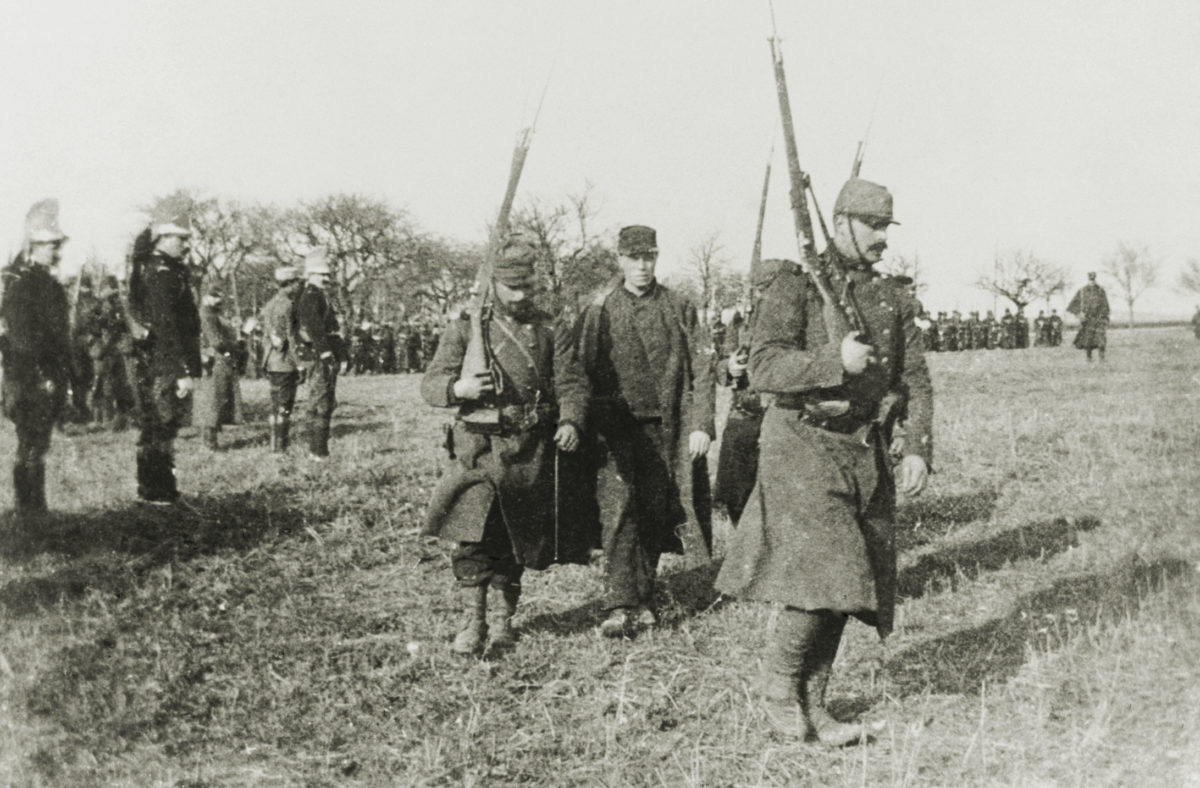Why Were These WWI Soldiers Executed By Their Own Country?
Published: 18 January 2023
By John A. Haymond
via the HISTORYNET web site

French deserter being marched off under escort after being degraded in front of his comrades, WWI
French Army Deserter being marched off under escort after being degraded in front of his comrades, WWI. Both Britain and France took a strong line towards deserters in the Great War and many deserters were killed for their actions. (Photo by Daily Herald Archive/National Science & Media Museum/SSPL via Getty Images)
All soldiers in World War I had one thing in common: possible execution by their own country for alleged cowardice. How did this actually affect armies?
In his First World War memoir Good-Bye to All That, the British poet and former infantry officer Robert Graves wrote, “I had my first experience of official lying when I arrived at Le Havre in May 1915 and read the back-files of army orders at the rest camp. They contained something like twenty reports of men shot for cowardice or desertion. Yet a few days later the responsible minister in the House of Commons, answering a question from a pacifist, denied that sentence of death for a military offence had been carried out in France on any member of His Majesty’s forces.”
It was indeed a lie. Between the beginning of the war in 1914 and the Armistice in 1918, 307 British and Commonwealth soldiers were executed by firing squad after courts-martial convicted them of cowardice or desertion, the latter charge described in very military language as “fleeing in the face of the enemy.” Included in that tally were 25 Canadian soldiers, 22 Irish servicemen, and five New Zealanders. How many Indian soldiers in British service were executed on the same charges is uncertain, but if their names were added to that grim tally the numbers would certainly be even larger.
Killed By Their Own Comrades
Numerous histories of the First World War have told how several of the belligerent nations executed men who were mentally and emotionally broken by the strain of frontline conditions, and who could endure the horrors of war no longer.
Whether because of an unwillingness to recognize the very real debilitating effects of shellshock and combat stress, or because the sheer scale and duration of that war overwhelmed military justice systems designed for shorter, smaller conflicts, the results were clear—some soldiers died not under the enemy’s guns, but in front of firing squads formed of their own comrades.
It would be too great a generalization to declare that every soldier executed on charges of desertion or cowardice was a traumatized combat casualty rather than a malingerer, but an examination of existing records suggests that at least as far as the British were concerned, it was true in a majority of cases.
The frequency with which the British Army applied the death penalty to accused deserters has garnered a great deal of literary attention since 1918, but it was never a uniquely British problem. Nor was the British Army unusually draconian in its use of capital punishment, when we compare its record to that of other nations fighting in the same war. In purely statistical terms, British soldiers who were convicted by courts-martial on charges of desertion or cowardice were actually at less risk of being executed than were soldiers of other armies.
Read the entire article on the HISTORYNET web site here:
External Web Site Notice: This page contains information directly presented from an external source. The terms and conditions of this page may not be the same as those of this website. Click here to read the full disclaimer notice for external web sites. Thank you.



